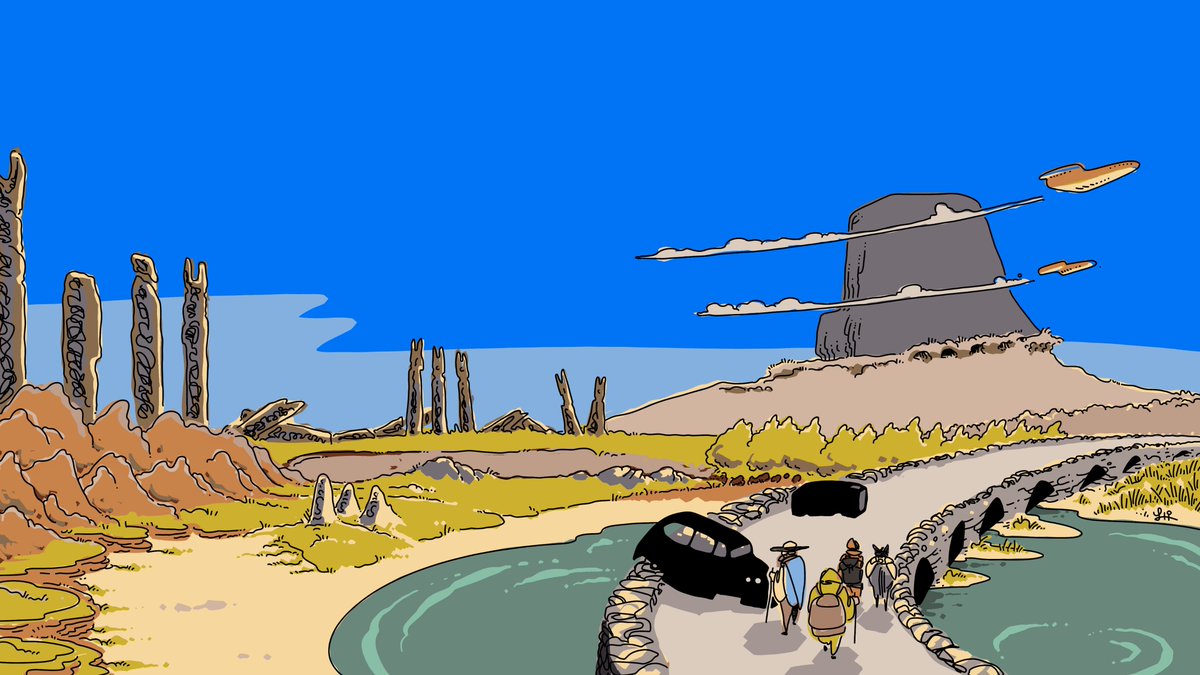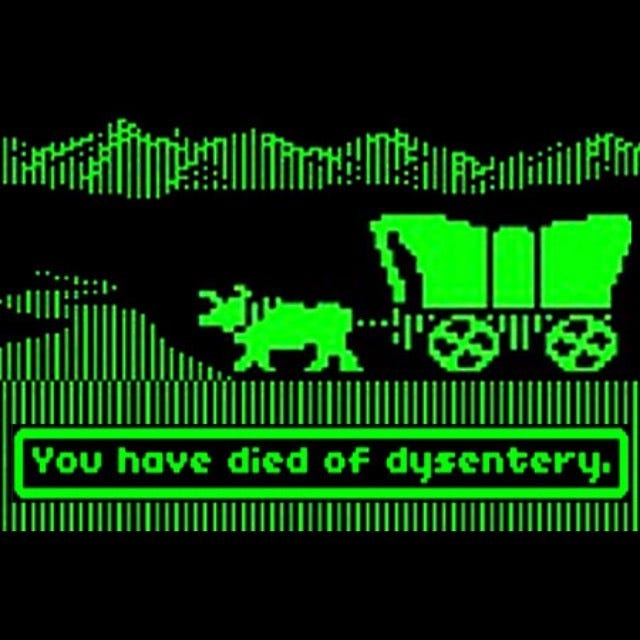I don't know how well that would work for Redwall. I have no familiarity with the books. But the concept struck a chord with me.
The characters gain 1 experience point per mile traveled. This is probably better suited to the GLOG and other systems with low XP totals, though you can scale up the numbers to get the same effect. XP systems shape the behavior of your PCs, more so than magic items or gold. Lots of OSR games are explicitly about gold-hungry PCs seeking wealth in the dungeon, but without a Gold-for-XP system, the players would quickly change their tune to overworld exploration, or dynasty building, or whatever other activity you incentivize.
Take as a general rule that players will obsessively seek out whatever you award XP for. So if you award XP per mile traveled without any other caveats, they will quickly figure out that traveling along a safe road back and forth between towns is the way to go. So which caveats do you add on?

Here are the rules I've settled on. I provide my rationale (read: stream of consciousness) below.
My Preferred Rules
PCs gain 1XP per mile closed to their destination. The distance from one destination to another is determined by the GM, and various routes are offered, with different lengths, terrain types, levels of danger, faction control, methods of travel, etc. The XP value for arriving at the destination is the same no matter what route is taken.
This set of rules is designed for a road-trip style campaign, where the PCs will rarely turn back, and have a set, distant goal. Traveling to a destination farther from their ultimate goal grants no XP. Backtracking along a route already taken drains XP, the same amount as was gained from traveling there in the first place. Regaining XP after backtracking or gaining XP for getting closer to one's goal after getting farther away occurs at the GM's discretion.
Traveling eats up supplies quickly and inexorably. Supplies are expensive and difficult to get hold of. The primary incentive to choose dangerous, shorter routes is to preserve supplies. The base assumption is that each character can carry their own equipment and a week's worth of supplies. Carting around treasures is difficult.
PCs are assumed to travel about 3 miles an hour over good terrain, and about 20 miles in an 8 hour travel day, 10 miles in a 4 hour activity block. Pushing for longer travel days covers more ground at the cost of exhaustion. Various terrain types reduce this travel rate appropriately.
Reasoning
Uses of Mileage XP
Well, what kind of game do you foresee using Mileage XP for? Do you want the players to explore the world, conquering mountaintops and mapping caves? Then you might be better off focusing on XP for climbing summits or completing surveys, with Mileage XP as a smaller reward making long trips to those locations worth their while.
Do you want this to be a mercantile campaign, a la UltraViolet Grasslands? Then Mileage would still be sidelined, with the focus instead on setting up trade routes, adding settlements to your network and acquiring new kinds of merchandise.
With real XP-per-mile-traveled progression, you'd be running a road trip, likely with a distant but certain end. Lord of the Rings fits the bill. So do some parts of Mad Max. You are here, you must get over there, and it's not going to be easy.
Critically, characters progress only by traveling towards their goal, which is not the same thing as getting closer to their goal. Given a choice between an easy, but very long path, and a challenging, but much shorter path, the
Instead, I would propose a rule, and a general principle.
The Backtrack Rule
Traveling along a new route grants XP as normal. But traveling along a previously trod route does not, and actively retracing one's steps drains XP. Under this rule, the party would be chary of ever traveling the same route twice, doubly in the opposite direction if it could be avoided.
Travel Troubles
Travel is difficult, and consumes resources like nobody's business. The necessary food, water, arms, first aid, bedding and shelter needed for travel across a hostile landscape is a heavy burden. If you have mounts and aren't in an area with plentiful water and grazing, expect to carry a mountain of feed.
 |
| UVG is great for this |
The Travel-Scavenge Cycle
This rule and principle, together, create a certain gameplay cycle: the party has enough supplies to travel from their current location to another nearby, on the way to their destination. They arrive with a lighter load, empty stomachs and likely in need of rest.
If this location is civilized, they will likely be able to get supplies and lodging with currency. If they don't have enough or the supplies are just expensive (and they should be), the party will be under pressure to make back their money through some scheme. Accepting a bounty in the area, taking up an eccentric request or burglarizing the richest-looking house will do. Just taking up odd jobs won't pay an adventurer's costs.
If this is an uncivilized or hostile place, the challenge becomes one of scavenging and surviving. The latter-day Fallout games are the best example. Find a new location, pacify anything hostile inside, scavenge anything and everything of value. Often, the path to the next destination will be blocked in some manner, requiring quick thinking, risk-taking or resource expenditure.
These destinations are distinguished from obstacles on the path in that the players want to be there, at least for a time before moving on. The PCs are drifters, driving through hell and high water to reach a new safe place, staying briefly and then leaving it behind with scorn.
Obstacles
And of course, there are the obstacles. Literal obstacles blocking trails, sure, but also intentional blockades demanding identification or a heavy toll, a horrible monster that considers this area its hunting grounds, an especially nasty swamp or other terrain type, or whatever else your twisted mind can come up with to complicate your PCs' attempts to get from point A to point B.
I personally would go with the UVG random encounter rule. The party is guaranteed to get a random encounter each week, but depending on how you roll, it might be far away enough to escape, indifferent enough to let the party pass, impotent enough to be no more than a brief annoyance, or possibly even friendly. On top of the guaranteed random encounter, I would put a pre-determined obstacle or encounter on most - say 70% - of those routes, for my own inspiration and to ensure a bit more control over the experience.

Mileage XP Variant 1 - As the Crow Flies
Instead of being rewarded per mile traveled, the players are rewarded per mile closed (the Spanish word in my head is 'acercado', but I don't know if 'closed' is the right English translation) to their destination. The actual distance between Rottentown and Niceville is thirty miles, but the direct route isn't easy. It takes you over the rocky, centipede-infested hills, while a winding route along the coast is sixty miles long, but is nice and flat.
Both routes would end up rewarding the same amount of XP once the players arrived in Niceville. The party who took the short, dangerous route would get there sooner, and might have conserved more supplies, but they're more exhausted and probably had to deal with more danger. The party that took the long route would trade time and supplies for safety. Neither party would lose out on travel XP, as they both got to their destination.
I think this is the method I will use. Set XP values for travel between two given points based on distance, create several routes with varying lengths and levels of danger. The XP reward is for reaching their destination. The big tradeoff here is between supplies, which diminish with time, and risk. Additional complications between routes, such as faction control, add incomparables that make a selection of route more than a matter of crunching the numbers. I don't think XP, that is, player progression, should be a factor in that tradeoff.

Mileage XP Variant 2 - Terrain bonuses
Under this variant, XP would vary based on terrain difficulty. If traveling through the mountains slows travel by half, then the party receives double XP. If travel speed is reduced by 25%, then XP is increased by 33%, and so on. I'm not too fond of this idea. It makes traveling the roughest, most difficult terrain the preferred strategy, placed against danger and supplies. With the above example of Rottentown and Niceville, the party would receive the same amount of XP overall, so long as the XP terrain ratio was the same as the ratio of distance of each route. However, this is needlessly restrictive, and pretty contrived. It comes to mind quickly, but I don't think this is a good option.
When to Award Mileage XP
All this begs the question of when to actually award the XP. This is very much up to taste, whether to award everything at the end of a session or in the moment, but stopping each fictional mile to award a point isn't a realistic option. The two main options as I see it are to tally everything up at the end of a session, or each time the party rests on the road. If distances are short and players can reasonably expect encounters every few days, this makes some sense. If the distances are longer, and you're measuring travel more in weeks than individual days, you'd be better off waiting until the end of each session.

Alternate Methods of Travel
So far all of this has been centered on foot travel, or possibly riding on mounts. Sea travel, air travel, trains, teleportation and other, less common methods of getting from place to place are assumed to be unusual. With the low-tech or post-apocalyptic setting implied by this XP system, we can assume that foot or mount travel is the default.
Finding a ferry boat, or a zeppelin willing and able to take you to your destination should be difficult, and a great reward. They can travel faster and avoid certain terrain difficulties. I would award XP gained from travel with these methods the same as with foot/mount travel, and make these methods appropriately difficult to find. Most ships don't go where you want them to, or they're not widely used. Finding a working metro line is miraculous. An airship is super-rare and difficult to use, and will probably break down quickly. These methods of travel greatly speed up the party's progress for a short period of time, and so can serve as very effective rewards and objectives for the party to chase.
Inspiration list
UVG
Mad Max
Fallout New Vegas
Sunless Sea
The Witcher
Walking Dead
Worth noting that xp per hex explored is a really easy way of getting players out exploring the world, and doesn't run into the problem of sticking to safe roads. It seems like this would run into a fair amount of bookkeeping because you'd need to keep track of exact mileage.
ReplyDeleteThat said, this definitely works for an UVG style campaign where there *aren't* hexes.
Yeah, I'm not a fan of hexes myself. Point-crawling is more my speed, and this was designed with that in mind. But just because you're on a route doesn't mean you're on a safe road, just that you're not trying to make your way through untrammeled wilderness. Safe roads should be rare, and infested with the tollmen who make them 'safe.'
DeleteXP-per-hex or XP-per-point-discovered, combined with XP-per-destination reached... I could see myself trying this!
ReplyDeleteIn LOTR, the mechanic is clearly "Start at 1st level, once you ally with a 2nd level character, you can play as them, and so on"